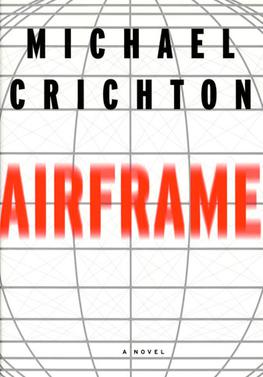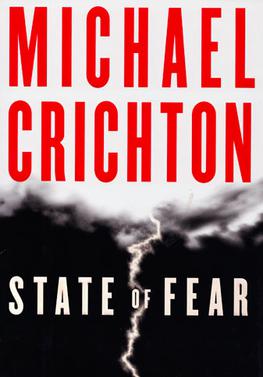Related Research Articles

John Michael Crichton was an American writer and filmmaker. His books have sold over 200 million copies worldwide, and over a dozen have been adapted into films. His literary works heavily feature technology and are usually within the science fiction, techno-thriller, and medical fiction genres. Crichton’s novels often explore human technological advancement and attempted dominance over nature, both with frequently catastrophic results; many of his works are cautionary tales, especially regarding themes of biotechnology. Several of his stories center specifically around themes of genetic modification, hybridization, paleontology and/or zoology. Many feature medical or scientific underpinnings, reflective of his own medical training and scientific background.

Defamation, at a first approximation, is any form of communication that can injure a third party's reputation. This can include all modes of human-understandable communications: gestures, images, signs, words. It is not necessarily restricted to making assertions that are falsifiable, and can extend to concepts that are more abstract than reputation – like dignity and honour. For a communication to be considered defamatory, it must be conveyed to someone other than the defamed. Depending on the permanence or transience of the communication medium, defamation may be distinguished between libel and slander. It is treated as a civil wrong, as a criminal offence, or both. The exact definition of defamation and related acts, as well as the ways they are dealt with, can vary greatly between countries and jurisdictions; for example, whether they constitute crimes or not, to what extent insults and opinions are included in addition to allegations of facts, to what extent proving the alleged facts is a valid defence.
McDonald's Corporation v Steel & Morris[1997] EWHC 366 (QB), known as "the McLibel case", was an English lawsuit for libel filed by McDonald's Corporation against environmental activists Helen Steel and David Morris over a factsheet critical of the company. Each of two hearings in English courts found some of the leaflet's contested claims to be libellous and others to be true.
A gossip columnist is someone who writes a gossip column in a newspaper or magazine, especially in a gossip magazine. Gossip columns are written in a light, informal style, and relate opinions about the personal lives or conduct of celebrities from show business, politicians, professional sports stars, and other wealthy people or public figures. Some gossip columnists broadcast segments on radio and television.

Roman à clef, French for novel with a key, is a novel about real-life events that is overlaid with a façade of fiction. The fictitious names in the novel represent real people, and the "key" is the relationship between the non-fiction and the fiction. This metaphorical key may be produced separately—typically as an explicit guide to the text by the author—or implied, through the use of epigraphs or other literary techniques.
New York Times Co. v. Sullivan, 376 U.S. 254 (1964), was a landmark U.S. Supreme Court decision ruling that the First Amendment to the U.S. Constitution's freedom of speech protections limit the ability of American public officials to sue for defamation. The decision held that if a plaintiff in a defamation lawsuit is a public official or candidate for public office, not only must they prove the normal elements of defamation—publication of a false defamatory statement to a third party—they must also prove that the statement was made with "actual malice", meaning the defendant either knew the statement was false or recklessly disregarded whether it might be false. New York Times Co. v. Sullivan is frequently ranked as one of the greatest Supreme Court decisions of the modern era.

Food libel laws, also known as food disparagement laws and informally as veggie libel laws, are laws passed in thirteen U.S. states that make it easier for food producers to sue their critics for libel. These thirteen states are the following: Alabama, Arizona, Colorado, Florida, Georgia, Idaho, Louisiana, Mississippi, North Dakota, Ohio, Oklahoma, South Dakota, and Texas. Many of the food-disparagement laws establish a lower standard for civil liability and allow for punitive damages and attorney's fees for plaintiffs alone, regardless of the case's outcome.
Forum shopping is a colloquial term for the practice of litigants having their legal case heard in the court thought most likely to provide a favorable judgment. Some jurisdictions have, for example, become known as "plaintiff-friendly" and so have attracted litigation even when there is little or no connection between the legal issues and the jurisdiction in which they are to be litigated.

Airframe is a novel by the American writer Michael Crichton, his eleventh under his own name and twenty-first overall, first published in 1996, in hardcover, by Knopf and then in 1997, as a paperback, by Ballantine Books. The plot follows Casey Singleton, a quality assurance vice president at the fictional aerospace manufacturer Norton Aircraft, as she investigates an in-flight accident aboard a Norton-manufactured airliner that leaves three passengers dead and 56 injured.

State of Fear is a 2004 techno-thriller novel by Michael Crichton, his fourteenth under his own name and twenty-fourth overall, in which eco-terrorists plot mass murder to publicize the danger of global warming. Despite being a work of fiction, the book contains many graphs and footnotes, two appendices, and a 20-page bibliography in support of Crichton's beliefs about global warming. Climate scientists, science journalists, environmental groups, and science advocacy organizations have disputed the views presented in the book.
Michael Leland Crowley is an American journalist who is a White House correspondent for The New York Times. Until May 2019, he was White House and national security editor for Politico. From 2010 to 2014, he served as the senior foreign affairs correspondent and deputy Washington, D.C. bureau chief for Time magazine and was senior foreign affairs correspondent for Politico.

Next is a 2006 satirical techno-thriller by American writer Michael Crichton. It was the fifteenth novel under his own name and his twenty-fifth overall, and the last to be published during his lifetime. It follows a number of characters, including transgenic animals, as they try to survive in a world dominated by genetic research, corporate greed, and legal interventions.
Modern libel and slander laws in many countries are originally descended from English defamation law. The history of defamation law in England is somewhat obscure; civil actions for damages seem to have been relatively frequent as far back as the Statute of Gloucester in the reign of Edward I (1272–1307). The law of libel emerged during the reign of James I (1603–1625) under Attorney General Edward Coke who started a series of libel prosecutions. Scholars frequently attribute strict English defamation law to James I's outlawing of duelling. From that time, both the criminal and civil remedies have been found in full operation.
The origins of the United States' defamation laws pre-date the American Revolution; one influential case in 1734 involved John Peter Zenger and established precedent that "The Truth" is an absolute defense against charges of libel. Though the First Amendment of the U.S. Constitution was designed to protect freedom of the press, for most of the history of the United States, the U.S. Supreme Court failed to use it to rule on libel cases. This left libel laws, based upon the traditional "Common Law" of defamation inherited from the English legal system, mixed across the states. The 1964 case New York Times Co. v. Sullivan, however, radically changed the nature of libel law in the United States by establishing that public officials could win a suit for libel only when they could prove the media outlet in question knew either that the information was wholly and patently false or that it was published "with reckless disregard of whether it was false or not". Later Supreme Court cases barred strict liability for libel and forbade libel claims for statements that are so ridiculous as to be obviously facetious. Recent cases have added precedent on defamation law and the Internet.

The Lost World is a 1995 science fiction action novel written by Michael Crichton, and the sequel to his 1990 novel Jurassic Park. It is his tenth novel under his own name and his twentieth overall, and it was published by Knopf. A paperback edition (ISBN 0-345-40288-X) followed in 1996. In 1997, both novels were re-published as a single book titled Michael Crichton's Jurassic World, which is unrelated to the 2015 film of the same name.

I Am Not A Serial Killer is a 2009 horror novel written by American author Dan Wells, originally published by Tor Books. It is Wells' debut novel and the first installment in the John Cleaver series. It is followed by five books, and has been published in English, Spanish, French, German, and Russian.
British Chiropractic Association (BCA) v Singh was an influential libel action in England and Wales, widely credited as a catalytic event in the libel reform campaign which saw all parties at the 2010 general election making manifesto commitments to libel reform, and passage of the Defamation Act 2013 by the British Parliament in April 2013.

Smallbone Deceased is a 1950 mystery novel by the English author Michael Gilbert, published in the United Kingdom by Hodder and Stoughton and in the United States by Harper & Brothers. A practising lawyer himself, Gilbert made the setting of the novel a London solicitor's office. It was Gilbert's fourth novel and, like his three earlier ones, features Chief Inspector Hazlerigg. The novel was well-received and has regularly appeared in "Top 100" crime lists. Some critics consider it to be Gilbert's best work.

"SLAPP Suits" is a segment of HBO's news-satire television series Last Week Tonight with John Oliver, focusing on strategic lawsuits against public participation (SLAPP). It first aired on November 10, 2019, as part of the twenty-ninth episode of the series's sixth season. The episode marked British-American comedian and host John Oliver's response to winning a SLAPP defamation lawsuit against him initiated by American mining businessman Robert E. Murray. The lawsuit began in 2017, after Oliver heavily criticized Murray and his company, Murray Energy, in a segment concerning the coal-mining industry in the United States. Murray claimed in his lawsuit that Oliver had carried out a character assassination against him, but the case was dismissed in under a year, and an appeal by Murray Energy was unsuccessful. During the lawsuit, the American Civil Liberties Union filed an amicus brief that was widely covered due to its sarcastic humor.
John C. Depp, II v. Amber Laura Heard was a trial held in Fairfax County, Virginia, from April 11 to June 1, 2022, that ruled on allegations of defamation between formerly married American actors Johnny Depp and Amber Heard. Depp, as plaintiff, filed a complaint of defamation against defendant Heard claiming $50 million in damages; Heard filed counterclaims against Depp claiming $100 million in damages.
References
- ↑ Dinitia Smith (24 October 1998). "Writers as Plunderers; Why Do They Keep Giving Away Other People's Secrets?". The New York Times . Retrieved 21 May 2013.
- ↑ Michael Conklin, The Big Problem with the Small Penis Rule: Why It Does Not Limit Defamation Liability, NEB. L. REV.: BULL. (March 17, 2021), Available at SSRN: https://ssrn.com/abstract=3750267 or http://dx.doi.org/10.2139/ssrn.3750267
- ↑ Felicia R. Lee (14 December 2006). "Columnist Accuses Crichton of 'Literary Hit-and-Run'". The New York Times . Retrieved 21 May 2013.
- ↑ Cole Moreton (27 May 2012). "Peter James: how I hit back at my stalker – and Martin Amis". The Sunday Telegraph .
- ↑ "Justice". QI XL. Season J. Episode 12. 8 December 2012. Event occurs at 12:08.